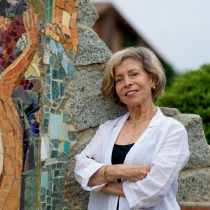
It is not new to comment that, in the still dominated patriarchal world of wine, women for several decades, but centuries have carefully promoted their own testimony of strength and merit and that today it elevates them to a well-deserved place of success in spaces of public figuration, the product of leadership with a broad and resilient gaze, a sadly scarce seal in the business world monopolized mostly by the male genre.
This column talks about, perhaps, “the icon woman of the Chilean wine industry”, personality that reflects the excellent example of unsurpassed energy and, which illustrates to the community all about what it entails overcoming the difficulties of a world that to date has more than 10,000 years globally of patriarchy and where women open up more and more space, among other things, always delivering vital oxygen in zygmund Bauman’s liquid society.
A world where culture sheltered in institutions and their infrastructure, from the notion of state in all its forms, to social elements such as intermediate groups and, of course, the family as the basic core of society, stumbles upon an ever wider rift that is no longer sustained, but in the ruling instability of every known cultural form.
Having said that, the importance of the active role of women and – what a woman comes to us! – have contributed, in my opinion, to promoting the collapse of the status quo that kept us deprived of intuitive or at least sympathetic leadership, as of those who write here in this column. Without further ado, the precursor that defies these lines today is…
María Luz Marín, public life of a self-made woman in Chile
At first instance, I must declare that this is the case of a woman, warrior mother and winemaker who demonstrated, like others, to become part of the pinnacle of the wine industry, a very complex scepter to access, not because you do not have the desire, skills and/or skills necessary to do so, but quite the contrary, because there is generally no will on the part of us men (and the elite) so that it is precisely they, the women who hold the coveted leadership positions in public or private organizations.
This ontological dialectic traces its origin in the thesis of fear endorsed by coercion for the preservation of power, has recently modified its law written in stone, allowing a certain degree of slack and impartiality, resulting in an increasing gender justice, legitimately illustrated by women as is the case of María Luz “Lulú” Marín.
The “Lulú” or “Marilú”, as his friends and acquaintances tell him, begins his story within a family of Santiago who, led by his father Osvaldo Marín who was of free mattresser, firefighter and boxer, decides to acquire through a blind auction, a field in the town of Lo Abarca, a village that is located in the commune of Cartagena, V region of Valparaíso.
This place he frequented together with his family always showed great agricultural potential, as generous vegetables worthy of admiration grew. Indeed, there is a virtuous relationship between the vast and cold Humboldt current that exerts a kind of pressure on the territory, permeating towards the rich geography, delivering the best for the great flora and fauna existing in this part of the world.
Later “Lulú” began her career as an Agronomoma Engineer at the University of Chile working in Viña San Pedro, which allows her at a very young age to travel the world, especially the old continent, which serves her to forge not only the first knowledge about the international wine business, but also an important network of contact to those who demonstrate her great capacity for work.
“A name is made,” says his son Felipe Marín, for later, always with the dream of free entrepreneurship, but without solid financial support to support a wine project, he continues his professional career in the field of bulk wine.
In this work it develops by buying and selling large volumes of wine in large receiving markets, work that allows it to collect more resources, always thinking about the final objective of assembling from scratch its own vineyard, with all the necessary inputs to not depend on anyone in the process and, that is when finally in the year 2000 buys the land where the vineyard is currently located with its vineyard.
But nor everything was “color of roses” because before the acquisition, no one believed in the project of a vineyard in a place as extreme as Lo Abarca. To get an idea, the vineyard is influenced by the effect of the sea in such a way that the cold of the coastal vaguada, a cloud of cold temperature rises over the territory, delivering the ever-destructive “ice” that kills the spring buds of the vine, totally or partially diminishing the annual cycle production of a vineyard.
Besides, what the hell could grow up in that icy, lightless environment? Indeed, there was always mistrust in the “eye and smell” of this vineyard on the part of the possible financiers. But, after being backed by consultants such as Greg LaFollette of Davis University, California, as well as vineyard manager, consultant and entrepreneur Ann Kraemer, she was a sure that the only option available was to borrow from private banking to get the necessary financial backs to carry out the “dream of her own vineyard”: Viña Casa Marín.
Many complexities, not to say hardship, the Marín family lived at the beginning of the project, especially in terms of costs that could not be fully covered. The fear of falling insolvent was always present in the first half of the business’s life, recalling that return flows on investments in this industry are generally long-term. Mistakes of various kinds were made, however, despite all this, as well as the suffering that came to tears, the “Lulu” always kept hope that the business would take off. And so he did.
According to Felipe himself, also an winemaker and winegrower of the vineyard, his mother’s idea was to differentiate himself with fine white wines, of very low production but of high quality that managed to address the premium segment (upwards), a crazy business strategy that is far from that of the generality of domestic exporters selling the average value of the box (12 units) at around $30 USD , compared to the $120 USD of Viña Casa Marín, four times more than the need for market, aspect that places them on the tariff cusp at the country level.
This small boutique vineyard, without being officially organic, practically all its processes are, but what makes them extremely proud is that they were declared sustainable, aspect that, according to Felipe, “is an integral feature, ranging from good social responsibility practices in terms of people participating in the vineyard and vineyard, the treatment of waste and carbon footprint , the final wine, among others, to the seal that your customers who, especially in Northern Europe, countries like Denmark that like our wines will see around the world.”
The vineyard, rather the “Lulu” has several palm trees in the testera. First, she was the first winemaker to work in a Chilean vineyard. Second, it became at the time the second largest executive in bulk wine sales on the planet. Third, it was the first price leader to break the barrier of the $10 worth bottle of white wine marketed on the British market. Fourth, in 2018 she was named by the specialized media The Drinks Business as one of the 100 most influential women in the world of wine. Quinto, from the long list of awards is worth highlighting the one received in 2009 by the prestigious magazine Decanter for the best Sauvignon Blanc on the planet.
However, according to history, one of the milestones achieved that the “Lulu” carries in its heart was to have achieved the creation of the appellation of origin (D.O.) It covers it before the National Institute of Industrial Property (INAPI). According to Felipe, “it was for more than 10 years driving the D.O. that we know would not have been possible without the quality of the wines it created”, that is, it is an extraordinary back to the years of hard work and consistency regarding the high quality of these wines.
In fact, it is doubly rewarding because, on the one hand, it means that it is fixed to the town of Lo Abarca on the world map of wine and, on the other hand, it is the only vineyard inside this D.O. that embodies it and represents it with wines of a particularity that manages to “differentiate itself from other terroirs, even from as close as San Antonio , Leyda or Lo Abarca,” Felipe finishes.
He continues, “if I had to recommend a single wine, the most distinctive would be Casa Marín Riesling Miramar, a wine that reflects the terroir with an exquisite acidity, salt and mineral that, over the years has been highlighted for its consistency and is characterized by its great potential of guard of 15 or 20 years easily upwards”.
Today, the “Lulu” no longer lives in the capital Santiago, but has settled permanently in Las Rocas de Santo Domingo. It is not quite withdrawn as for some time it has been part of the board of the gremial association Wines of Chile, an organization where the most relevant public and private institutions participate in the matter, in which she plays a topical role of representation for the small vines of the country. Likewise, thanks to his vast experience and irrefutable tonnage, he is now more dedicated to a role as CEO of the vineyard.
Today it is her children and daughter-in-law who take the baton to take over the family business, so that she can manage global decisions and dedicate time and love to the new generations, their grandchildren.
The remaining taste after sharing these lines is that of, inexorably, having fallen short. Yes, short of words and ideas to try, in this desire to make an audience homage of a biographical character, to express the entire character in such a short column that illustrates the great capacity and extension of this, for which we would require a complete chapter and thus encompass personality and life integrally.
Most likely, as well as all these great “phenomena” that appear sparsely around the world from time to time, it will be more examined post-life along with his work, work that will surely persist by weaving new generations for decades, in this case, interested in wine.
However, the sle of it goes far beyond the circumscribed world of this noble drink, for the model of Mary Marín Light infallibly concerns that of a kind of cultural entity intrinsic to the relationship of space time, this because of its human quality typical of a grandiose and, as some great politician of the eastern axis ever said in the history of the planet , “allow 100 Light Marys to flourish and 100 schools of thought to compete…”, is what I would dedicate to her.
The content poured into this opinion column is the sole responsibility of its author, and does not necessarily reflect the editorial line or position of El Mostrador.





